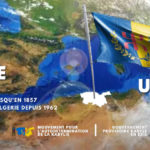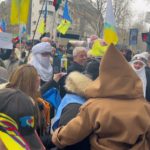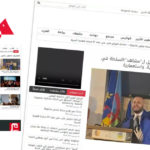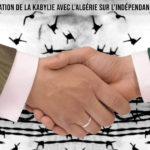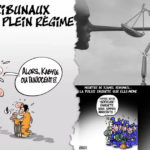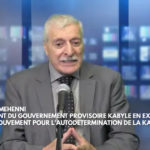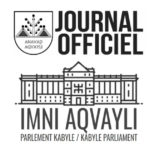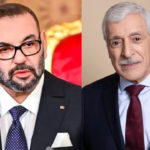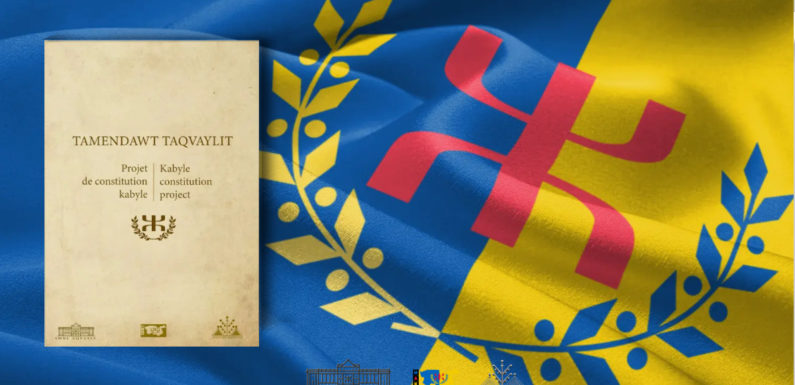
Text made public after respecting the primacy reserved for the version in the Kabyle language, the official language of Kabylia, the publication of which was made on June 14, 2022, on the occasion of the Kabyle Nation Day It's submitted to public debate to democratically enrich the final version of the Kabyle Constitution, the founding act of the advent of the future Kabyle State. How did this Kabyle draft Constitution come about? This draft constitution is the result of more than two years of work and reflection in which the members of the Kabyle Parliament (Imni) participated during various sessions. It was then critically reviewed by the Kabyle Provisional Government (Anavad) and its Presidency, and again submitted to Imni for approval. Several authorities in constitutional law have contributed to this draft, which will be submitted to the Kabyle people for discussion and enrichment. KABYLE DRAFT CONSTITUTION Table of contents PREAMBLE .............................................................5 TITLE I: THE FOUNDATIONS ............................................17 TITLE II: THE FUNDAMENTAL INSTITUTIONS ..............................22 TITLE III: THE FEDERATED STATES .....................................24 CHAPTER 1: TAJMAΣT ..................................................26 CHAPTER 2: THE ARCH ASSEMBLY ........................................28 CHAPTER 3: THE STATE PARLIAMENT .....................................29 CHAPTER 4: THE FEDERATED STATE GOVERNMENT ...........................31 TITLE IV: THE FEDERAL STATE .........................................33 CHAPTER 1: THE PRESIDENCY OF THE REPUBLIC ...........................33 CHAPTER 2: THE FEDERAL PARLIAMENT ...................................36 SUBCHAPTER 1: THE PARLIAMENT ........................................36 SUBCHAPTER 2: THE SENATE ............................................39 SUBCHAPTER 3: THE CONGRESS ..........................................39 CHAPTER 3: THE CONSTITUTIONAL COUNCIL ...............................41 CHAPTER 4: THE FEDERAL GOVERNMENT ...................................42 CHAPTER 5: THE JUDICIAL COUNCIL .....................................44 CHAPTER 6: THE COUNCIL OF STATE .....................................45 CHAPTER 7: THE HIGH SECURITY COUNCIL OF KABYLIA (HSCK) ..............46 CHAPTER 8: THE ECONOMIC, SOCIAL AND ENVIRONMENTAL COUNCIL OF KABYLIA (ESECK) .....................................................................47 TITLE V: THE SECURITY FORCES ........................................48 TITLE VI: THE COMMUNICATION AND AUDIOVISUAL COUNCIL (CAVC) ..........50 TITLE VII: THE KABYLE ACADEMY .......................................51 TITLE VIII: REGIONAL AND INTERNATIONAL COOPERATION ..................51 TITLE IX: INTERNATIONAL AGREEMENTS, TREATIES AND COVENANTS ..........52 TITLE X: THE REVISION OF THE CONSTITUTION ...........................52 GLOSSARY ............................................................54 ANNEXES .............................................................56
PREAMBLE
Kabylia has always loved life, freedom and solidarity. These three philosophical cornerstones have contributed to the structuring of its culture of equality and secularism, as well as its everlasting attachment to its independence. These are the values that have shaped its strong character and form the basis of its social contract, democracy and national cohesion.
Besides humans, nature is not neglected; the Kabyles scrupulously watch over its protection and make it their duty, for example, during crop picking and seasonal harvests to leave a share for the birds, insects and other animals.
Amazigh and North African, it still has a linguistic base that links it to its geographical environment and bears witness to its attachment to its ancestral language: Kabyle.
Mediterranean, it has given as much as it has borrowed from a Judeo-Greek-Roman culture, and many of its tales and legends still overlap with its cultural and religious heritage.
Punic cross-fertilisation at Carthage, which had lasted no less than seven centuries, the Vandal blows during the fifth century and the Byzantine wars in the sixth century, did not change Kabyle society.
Kabylia has welcomed all the beliefs that had reached it, from Babylon to the Atlantic, from sub-Saharan Africa to Europe. It has acclimatised them, pacified them and remains far from the turmoil and wars of religion. Basically secular, it is at once animist, pagan, polytheist, Jewish, Christian, Muslim, atheist and agnostic. It is tolerant of all religions and respectful of all cults without privileging one to the detriment of the others, hence the persistence to the present day of its oath: JMAƐ LIMAN (in the name of all beliefs).
Rebellious to any authority that does not emanate from its own will, it has the ardour and valour of a Jugurtha and the wisdom and spirit of responsibility of a Massinissa. From Dihya, known as Kahina, and Fadma n Summer, it has retained the respect and deference due to women, especially during the conduct of the war against the invaders.
Since the dawn of time, Kabylia has organised itself into confederations, since the fourth century of the Christian era, as eminent historians have attested. Thanks to its socio-political organisation based on a hierarchical solidarity, and its steep landscape, Kabylia had protected its independence and its unity far from the successive invasions on North Africa. Neither Rome, nor the Vandal and Hilalian hordes, nor the Janissaries had been able to subdue or annihilate it. Kabylia has thus remained Kabyle over the millennia and forever.
Anti-colonialist and, despite its incessant wars and battles against the Turkish Regency of Algiers, Kabylia
alone had mobilised against the French landing in Sidi-Fredj, in 1830, before battling with all its strength against its annexation into Algeria from the 1850s onwards. Still, it refuses to be placed under foreign guardianship.
Despite its military defeat at the historic battle of Icerriden in 1857, Kabylia revolted once more against this annexation during the spring of 1871, under the leadership of Ameqran and Ccix Aheddad. More than 250,000 men were mobilised but due to the French technological and military superiority this insurrection was defeated.
Despite the trauma of the defeat of 1871, Kabylia never accepted its colonised status. After rebuilding its structures, it created the Etoile Nord-Africaine (ENA) a in 1926, to begin recapturing its freedom.
At that time, it believed that the solution for the recovery of its sovereignty was in alliances with those around it, against the French occupation. It was by planning its own liberation that the country began the fight for decolonisation on a North African scale. The anti-Kabyle orientation of the ENA (which became PPAb and then MTLDc) had put it on a false path that the 1954–1962 war turned into a new colonial trap. By investing in the liberation of a territory other than its own, Kabylia found itself under the domination of the country for whose liberation it had just paid the highest price.
Kabylia, which had come to understand this since the 1963–1965 war, was not armed against the new ideologies of Algerian nationalism and North African pan-Amazighism.
Instead of defining itself from within itself, it continued to do so based on its geopolitical environment of which it would only make up a negligible part: this is how it came to think of itself as Berber and Algerian, even though Algeria still defines itself as exclusively « Arabic ». Two generations of Kabyles struggled to
reconcile being Amazigh with being Arab, before they abandoned the idea. They note with resentment that Algeria cannot accept the existence of a state of being that rivals being Arab. For Algeria to live, Kabylia is condemned to die. This is an obvious fact that the Kabyle elites took a long time to grasp and admit. To gain this awareness, it was necessary to relinquish two of their most tenacious dreams: that of an Algeria « fraternal, democratic and plural », and that of an « Amazigh nation and language ».
On the one hand, the two main Kabyle political parties, which were prisoners of this situation, became disillusioned as early as 1989. They were never able to unite those around them outside of Kabylia. The various elections have clearly shown their territorial limits are confined to Kabylia and have annihilated the ambitions of their leaders to have a « national destiny ». Inside the Algerian political game, they are crushed and eaten up by Algeria, then rejected by Kabylia because they did not have the courage to face up to Algeria.
On the other hand, there was the dream of creating a homogeneous North African political ensemble, legacies of the crisis, the so-called Berberism, of 1949, which had been taken up by the Académie Berbère [Berber Academy] from 1966 to 1976, and which it carried for more than twenty years via the MCBd. The latter did not survive the passage of time, and the end of its mission was demonstrated by the emergence of the Archs (1), who, as meteoric as they were ephemeral, had swept all previously existing Kabyle militant structures aside within three years.
The Black Spring revolt from 2001 to 2003 was the turning point in Kabylia’s history, a revolutionary moment when a new world was created on the ruins of ideas that had had their time. By firing weapons of war at young and peaceful protesters in Kabyle, the Algerian colonial power had once again shown its true nature regarding the Kabyle people. The murder of a young high school student by an Algerian gendarme on 18 April 2001 was considered one provocation too many after the murder, three years earlier, on 25 June 1998, of Matoub Lounès. These events gave rise to vast and peaceful demonstrations between 2001 and 2003. As a result, at least 128 young people were murdered, thousands injured and hundreds disabled for life. By being unable or unwilling to stand in solidarity with Kabylia, Algeria had just demonstrated that it was not one nation and that, at the very least, those Kabyles it treated as enemies were not part of it.
With the declaration of 5 June 2001 (e), and by demanding a separate future for Kabylia, the El-Kseur platform backed by the historic march of more than two million Kabyles in Algiers on 14 June 2001, Kabylia turned its back on its Algerianist and Pan-Amazigh illusions. From now on, Kabylia took its destiny into its own hands and embarked on its path towards freedom by using the Movement for the Autonomy of Kabylia [Mouvement pour l’Autonomie de la Kabylie = MAK]f as its justification, which in 2013 became the Movement for the Self-Determination of Kabylia [Mouvement pour l’Autodétermination de la Kabylie]. Once again, there is hope, whatever the difficulties and hardships may be. MAK’s rise has created new alternatives, among which the right to self-determination and the independence of the Kabyle people were welcomed.
From now on, any other solution would represent a total contradiction of the construction of a modern and sovereign Kabyle State. This is all the more evident in view of the repressive measures to which the Kabyle people have been subjected since 1963, and which have always led them to wish to emancipate themselves from an Algeria that oppresses and rejects them.
In 2021, this oppression reached its peak with the implementation of a genocidal plan called Operation « Zero Kabyle » (2). This plan, which was officialised in August 2019 was implemented via the arrest of Kabyle elites, the confiscation of the resources needed to fight the Coronavirus pandemic and the gigantic fires that were started from 9 August 2021 onwards by the Algerian military. These arson attacks have resulted in more than 500 deaths and an ecocide which created a landscape of desolation throughout Kabylia’s territory.
Kabylia’s desire for independence has passed the point of no return, notably with the boycott and rejection of the presidential elections of 12 December 2019, the referendum for the revision of the constitution of 1 November 2020, the legislative elections of 12 June 2021 and the local elections of 27 November 2021.
Kabylia’s independence will allow it to protect its people from all foreign domination, linguistic and cultural alienation, racism and intolerance of which they have been victims since 1857. It paves the way for its economic development with the liberation of private initiatives and the assumption of domains of sovereignty and public services by the State.
Education and investment in people, knowledge, fundamental research and technological innovation ensure that Kabylia has a strong international presence. Freedom of the press and the separation of powers, among others, contribute to the consolidation of the rule of law and the spread and taking root of democracy. It nurtures a culture of peace, justice and freedom in and around its territory.
Independent Kabylia contributes to regional security and stability, the economic integration of both the Mediterranean Basin and the whole of Northern Africa. It combats terrorism, in accordance with its values, within the framework of international law and in strict compliance with human rights and all the international conventions it has ratified.
It is working to reintegrate all of its historic territories into the framework of international law.
We reaffirm with strength and determination our desire to live in peace, free and independent as well as to cooperate in friendship and brotherhood with all the peoples of the world.
Considering all of the above, We, the Kabyle People, adopt and proclaim this Constitution.
TITLE I: THE FOUNDATIONS
Article 1: Kabylia is a federal republic called the: Federal Republic of Kabylia.
Article 1.1: The Federal Republic of Kabylia is composed of States whose number and names are fixed by an Organic Law.
Article 1.2: Its borders are determined by the outer border limits of its Federated States along its periphery.
Article 2: Its national and official language is the Kabyle language.
Article 3: Its national emblem is « ANAY AQVAYLI » , consecrated by and during the years of struggle for independence.
Article 4: Its national anthem is « ASS N TLELLI » .
Article 5: Its official motto is:
TAQVAYLIT TEZWAR AYEN YELLAN
Article 6: Kabyle nationality is based on the law of blood and the law of the soil. The acquisition of Kabyle nationality is defined by the Nationality Code.
Article 7: Kabylia is a secular republic.
Article 7.1: The management of religious worship is a private matter.
Article 7.2: Freedom of conscience is guaranteed. Nobody may impose a religious belief on anyone or disturb someone’s religious belief.
Article 7.3: No worship may be financed by foreign sources.
Article 8: The Kabyles, members of the great Amazigh family, are free citizens who defend the independence and sovereignty of their homeland.
Article 9: National sovereignty belongs only to the Kabyle people, who exercise it through direct or indirect elections or by referendum.
Article 10: Democracy, the fundamental value of Kabylia, is its system of governance.
Article 11: The separation of powers is a fundamental principle of the Federal Republic of Kabylia.
Article 12: Respect for human rights is guaranteed in accordance with the Universal Declaration of Human Rights and relevant international conventions.
Article 12.1: The equality of the rights of men and women is inviolable.
Article 12.2: The right to organise strikes, demonstrations and mass gatherings is guaranteed.
Article 12.3: The rights to freedom of opinion, expression and organisation are constitutional rights.
Article 12.4: The creation of political, trade union and associative organisations takes place by declaration, without prior authorisation.
Article 12.5: Physical integrity and human dignity are guaranteed by the constitution.
Article 12.6: The death penalty is prohibited.
Article 12.7: Freedom of enterprise is guaranteed.
Article 13: The Federal Republic invests in public services and in areas of national sovereignty: defence and national security, energy, public order, justice, health, transport, education and research.
Article 14: Respect for nature is guaranteed by the Constitution in accordance with international conventions on the preservation of the planet and in accordance with the ancestral values of Kabylia.
Article 15: The absolute age of majority is attained at the age of 18.
Article 15.1: The right to vote is acquired at the age of 17.
Article 16: Schooling is free. It is compulsory until the age of 17.
Article 17: Health and social solidarity are guaranteed by the Federal Republic of Kabylia.
Article 17.1: The right to accommodation is guaranteed.
Article 18: In the event of a threat to Kabylia, the Federal Republic will make available to the Kabyle people all the means necessary to defend their homeland.
Article 19: Any law contrary to these foundations of the Federal Republic of Kabylia shall be null and void and subject to repeal.
TITLE II: THE FUNDAMENTAL INSTITUTIONS
Article 20: The fundamental institutions of the Republic are: the Presidency, the Federal Government, the Federal Parliament, the Senate, the Congress, the Constitutional Council, the Judicial Council, the Council of State, the Governments of the Federated States, the Parliaments of the Federated States, the Archsg and Tajmaεth.
Article 20.1: These institutions have their extension in the Federated States, each with its Executive, Legislative, Judicial and Advisory Powers.
TITLE III: THE FEDERATED STATES
Article 21: The Federated States of Kabylia are the state institutions that represent and administer the Archs forming its territory as defined by law.
Article 21.1: The competences of the Federated State concern all state prerogatives with the exception of the sovereign prerogatives of the Federal State of Kabylia.
Article 21.2: Each Federated State has a Parliament whose government is formed by a partisan majority or a political coalition.
Article 21.3: Prior to its promulgation, any law is subject to the approval of the constitutional council.
Article 21.4: Each Federated State draws up its provisional budget. The latter is submitted to the Federal Government for its inclusion in the national finance law.
Article 21.5: Each federated State has university, hospital, cultural and sports centres.
Article 21.5.1: Each Federated State has all the public or private infrastructures necessary for its development.
Article 21.5.2: The administrative division and internal borders of a Federated State are part of the latter’s jurisdiction. In the event of a dispute over territorial boundaries, the Federal State ensures the dispute’s arbitration.
Article 21.5.3: The administrative division and inter-Federated-State borders are shared jurisdictions between the Federated States and the Federal Government of Kabylia.
CHAPTER 1: TAJMAΣT
Article 22: The Tajmaεt is the basic institutional body, the first level of the Federal Republic of Kabylia.
Article 22.1: The Tajmaεt is an assembly whose characteristics, tasks and prerogatives are defined by law.
Article 23: The Tajmaεt is managed by a citizens’ assembly whose members are aged 18 and over.
Article 23.1: Each Tajmaεt elects its executive in accordance with the law.
Article 23.2: The Tajmaεt is equipped with a collection of public services, schools, and a hospital centre as well as leisure, cultural and sports centres.
Article 23.3: A Tajmaεt of more than 5,000 inhabitants is divided into Tisgai, based on an administrative division validated by the bodies of the Federated State.
Article 23.4: When a Tajmaεt exceeds 5,000 members, it is the delegates of its Tisga who form the Tajmaεt, at a rate of at least three representatives for each of them.
Article 23.4.1: The delegates of each Tajmaεt are elected by direct local suffrage.
Article 23.4.2: The procedure for the election of the Tajmaεt Assemblies is determined by the electoral laws.
CHAPTER 2: THE ARCH ASSEMBLY
Article 24: The Arch is the second institutional level of the Federal Republic of Kabylia.
Article 24.1: The Arch is an assembly whose characteristics, tasks and prerogatives are defined by law.
Article 24.2: The procedures for the election of the Arch Assembly are determined by the electoral laws.
Article 24.3: The Presidents of each Tajmaεt Assembly and at least one representative from each Tasga form the Arch Assembly, the boundaries and composition of which are determined by law.
Article 24.4: The election of the President of the Arch Assembly takes place by indirect suffrage, by the members of this assembly.
CHAPTER 3: THE FEDERATED STATE PARLIAMENT
Article 25: The Parliament of the Federated State is the legislative institution of the Federated State.
Article 25.1: The Parliament of the Federated State is elected by universal suffrage at the level of the Federated State.
Article 25.1.1: The President of the Parliament of the Federated State is elected by an absolute majority of the members of said Parliament.
Article 25.1.2: The laws adopted by the Parliament of the Federated State are promulgated by its Governor and the President of the Republic.
Article 25.2: In the event of the non-adoption of a governmental law, the Government assumes responsibility and legislates by ordinance.
Article 25.2.1: Legislation by ordinance is limited to once per parliamentary session.
Article 25.3: The Parliament of the Federated State meets in an annual parliamentary session that runs from the first week of September to the first week of July.
Article 25.4: If necessary, an extraordinary parliamentary session may be convened in July and August by the Government of the Federated State.
Article 28.2.1: After consultation with the Prime Minister, the President of the Republic appoints the Ministers of Defence, Foreign Affairs, Interior, Finance and Justice to their sovereign posts.
Article 28.2.2: The President of the Federal Republic is the guarantor of respect for the constitution.
Article 28.2.3: The President of the Republic may resort to a consultative referendum.
Article 28.2.4: In the event of an exceptional situation not provided for in the constitution, the President of the Republic shall legislate by decree.
Article 28.3: The President of the Republic along with his/her Vice-President whom he/she will have chosen before his/her election, is elected by universal suffrage for a term of office of five (5) years, renewable only once.
Article 28.3.1: The term of office of the President of the Republic, the Federal Parliament and the
Parliaments of the Federated States all have the same duration, the same beginning and the same end.
Article 28.4: In the event of the death of the President of the Republic, his/her resignation or permanent incapacity to exercise his/her office, his/her Vice-President shall continue his/her term of office until its end.
Article 28.4.1: In the event of the death, resignation of the successor or permanent inability to exercise his/her role, an early presidential election shall be held within ninety days.
Article 28.4.2: The provisional exercise of the presidential function up to the election and assumption
of office by the new President of the Republic shall be ensured in order of priority by:
CHAPTER 4: THE FEDERATED STATE GOVERNMENT
Article 26: The Government of the Federated State is the highest executive authority. Its decisions apply in its territory.
Article 26.1: Its mission is to carry out the programme of the parliamentary majority or the joint programme of a government coalition.
Article 27: The Governor of the Federated State is determined by a parliamentary majority or a government coalition.
Article 27.1: The President of the Republic formalises the appointment of the Governor.
Article 27.1.1: The Governor submits the composition of his/her Government to the President of the Republic.
Article 27.1.2: The Governor is accountable to the Parliament of the Federated State and to the President of the Republic.
Article 27.1.3: The Governor may be removed by a parliamentary vote of no confidence, with an absolute majority of the elected representatives.
Article 27.2: In the event of the death of the Governor, his/her resignation or inability to perform his/her duties, the President of the Republic shall formalise the installation of a new Governor, proposed by the parliamentary majority or the government coalition.
TITLE IV: THE FEDERAL STATE
CHAPTER 1: THE PRESIDENCY OF THE REPUBLIC
Article 28: The Federal Republic of Kabylia is headed by the President of the Republic.
Article 28.1: The President of the Republic is responsible to the nation.
Article 28.2: The President of the Republic is the Head of State and the supreme head of all the bodies forming the Laεnayaj.
The President of the Senate.
The President of the Federal Parliament,
The President of the Constitutional Council.
Article 28.4.3: The role of the interim presidency, with the government in office, shall be limited to the dispatch of current affairs and the organisation of early presidential elections.
CHAPTER 2: THE FEDERAL PARLIAMENT
SUBCHAPTER 1: THE PARLIAMENT
Article 29: The Federal Parliament is the legislative institution of the Federal Republic of Kabylia.
Article 29.1: The Federal Parliament is elected by universal suffrage for a term of five years.
Article 29.1.1: The President of the Federal Parliament is elected by an absolute majority of the members of said parliament.
Article 29.1.2: Laws adopted by the Federal Parliament are promulgated by the President of the Republic after their validation by the Senate and the Constitutional Council.
Article 29.1.3: If one or more articles of a law are contested by the Senate, the latter shall propose amendments which are submitted to Parliament. It is only after the law’s approval by both Houses that it is promulgated.
Article 29.1.4: In the event of a disagreement between the two Houses of the Federal Parliament following a second reading, the Federal Government assumes responsibility and legislates by ordinance.
Article 29.1.5: Legislation by ordinance is limited to five (5) instances per parliamentary session.
Article 29.2: The Federal Parliament meets in an annual parliamentary session that runs from the first week of September to the first week of July.
Article 29.3: If necessary, an extraordinary parliamentary session may be convened in July and August by the Federal Government.
SUBCHAPTER 2: THE SENATE
Article 30: The Senate is the upper House of Kabylia’s deliberative legislative bodies. It examines the validity of laws after their first adoption by the federal parliament.
Article 30.1: The members of the Senate are elected by the Archs Assemblies. The methods for their election are laid down by law.
Article 30.2: The President of the Senate is elected by an absolute majority of the members of said Senate.
SUBCHAPTER 3: THE CONGRESS
Article 31: The Congress is the meeting of the Kabyle State institutions.
Article 31.1: The Congress is divided into the following two constitutional forms:
The parliamentary congress
The expanded congress.
Article 31.2: The Congress in its parliamentary form, known as the « Parliamentary Congress », is a meeting of all the parliamentary chambers of the Kabyle State.
Article 31.3: The Congress in its expanded form, known as the « Expanded Congress », is a meeting of all the institutions of the Kabyle State.
Article 31.4: The mission of the Parliamentary Congress is to vote on constitutional revisions.
Article 31.5: The mission of the Expanded Congress is:
The making of a major political decision that binds the Nation.The hearing of a solemn declaration by the President of the Republic
Article 31.6: The Congress Office is the office of the Federal Parliament.
CHAPTER 3: THE CONSTITUTIONAL COUNCIL
Article 32: The Constitutional Council ensures the constitutionality of the laws. It may be called upon by a civil society organisation, a citizens’ petition whose threshold is set by law, a federal parliamentary or Federated State group, the Federal Government or a Federated State Government.
Article 32.1: it is elected for a term of seven years by the Federal Parliament, the Senate and the Judicial Council.
Article 32.2: The President of the Constitutional Council is appointed from among its members by the President of the Republic.
CHAPTER 4: THE FEDERAL GOVERNMENT
Article 33: The Government of the Federal Republic of Kabylia is the highest executive authority in all its spheres of competence.
Article 33.1: Its mission is to carry out the programme of the majority or the joint programme of a government coalition, under the responsibility of the President of the Republic.
Article 33.2: The Government of the Federal Republic of Kabylia is formed and headed by a Prime Minister.
Article 33.3: The Prime Minister is chosen by the President of the Republic from among the parliamentary majority to form his/her Government.
Article 33.3.1: The Prime Minister submits the composition of his/her Government to the President of the Republic, who, after agreement, appoints the same.
Article 33.4: The Prime Minister is accountable to the Federal Parliament and the President of the Republic.
Article 33.5: The Prime Minister may be dismissed by a parliamentary vote of no confidence by a two-thirds majority of its members.
Article 33.6: The Prime Minister may be dismissed by the President of the Republic.
Article 33.6.1: In the event of the death, resignation or inability of the Prime Minister to exercise his/her mission, the President of the Republic shall provide for his/her succession.
Article 33.7: The Federal State budget is determined by the Federal Parliament based on the Federal Government’s proposal.
CHAPTER 5: THE JUDICIAL COUNCIL
Article 34: The Judicial Council is the body that ensures that the code of ethics and moral integrity of judicial personnel are respected.
Article 34.1: It is elected by two colleges:One is made up of magistrates (judges and prosecutors) who have served for at least five years.
The other of lawyers.
Article 34.1.1: The President of the Judicial Council is elected by an absolute majority of its members.
Article 34.1.2: His/her term of office is six (6) years.
Article 34.1.3: The President of the Judicial Council may not hold office for more than two terms.
CHAPTER 6: THE COUNCIL OF STATE
Article 35: The Council of State is the supreme court of appeal with regard to judicial matters. Its reasoned decisions set a precedent.
Article 35.1: It is elected for a term of seven years by the Judicial Council.
Article 35.2: The President of the Council of State is elected by an absolute majority of the members of said council.
CHAPTER 7: THE HIGH SECURITY COUNCIL OF KABYLIA (HSCK)
Article 36: The High Security Council of Kabylia (HSCK) is a watchdog body and a permanent Crisis Committee whose mission it is to examine, at any time, the security threats facing the Kabyle Nation and people and
Article 36.1: The High Security Council of Kabylia makes its recommendations to the President of the Republic.
Article 36.2: The organisation and functioning of the HCSK, its composition, its prerogatives and the duration of its mandate are defined by law.
CHAPTER 8: THE ECONOMIC, SOCIAL AND ENVIRONMENTAL COUNCIL OF KABYLIA (ESECK)
Article 37: The Economic, Social and Environmental Council of Kabylia (ESECK) is a national consultative body, bringing together the active forces of the Kabyle Nation’s civil society.
Article 37.1: The ESECK is called upon by the Federal Government or the Federal Parliament to provide advice, draw up reports or carry out studies on specific subjects.
Article 37.1.1: It may also call upon itself.
Article 37.2: The ESECK’s organisation and functioning, its composition, its prerogatives and the duration of its mandate are defined by law.
TITLE V: THE SECURITY BODIES
Article 38: The LAƐNAYA are all the institutions of the Federal Republic of Kabylia bringing together all the official security forces, for the protection and defence of Kabylia and the Kabyle people.
Article 38.1: If necessary, other auxiliary bodies at the level of the Federated States shall be implemented by the local executives after a vote by their parliaments.
Article 38.2: Kabyle security bodies are composed of actively engaged forces, and reserve forces that can be mobilised when the situation so requires.
Article 38.3: Voluntary national service is open to any Kabyle citizen to contribute to the national construction effort.
TITLE VI: THE COMMUNICATION AND AUDIOVISUAL COUNCIL (CAVC)
Article 39: The Communication and Audiovisual Council is the regulatory authority for communication and audiovisual media.
Article 39.1: Its mission is to guarantee the exercise of the freedom of communication and that of the audiovisual media.
Article 39.2: Its organisation, establishment and operation are defined by law.
TITLE VII: THE KABYLE ACADEMY
Article 40: The Kabyle Academy is the institution responsible for the protection, enhancement and promotion of the Kabyle language.
Article 40.1: Its composition, prerogatives and organisation are defined by law.
TITLE VIII: REGIONAL AND INTERNATIONAL COOPERATION
Article 41: The Federal Republic of Kabylia is part of the Amazigh, North African, Mediterranean and African areas.
Article 41.1: The Federal Republic of Kabylia is working to build spaces of North African,
Mediterranean, continental and European cooperation and solidarity.
TITLE IX: INTERNATIONAL AGREEMENTS, TREATIES AND COVENANTS
Article 42: The Federal Republic of Kabylia accedes to and ratifies all international agreements, treaties and covenants, including those protecting human rights, democracy, the environment and peace in the world.
TITLE X: THE REVISION OF THE CONSTITUTION
Article 43: The federal and republican forms, values and foundations of the Kabyle State enshrined in the Constitution of the Federal Republic of Kabylia may not be revised.
Article 44: The constitution may be revised only on the initiative of the President of the Federal Republic of Kabylia.
Article 44.1: With the consensus of all governors, proposals for constitutional revisions may be submitted to the President of the Republic, who shall make the decision.
Article 44.2: Depending on the decision made by the President of the Republic, the revision of the constitution may be carried out either by referendum or by the convening of the parliamentary Congress.
Article 45: In the event that a decision to revise the constitution is made by the Parliamentary Congress, its adoption can only be validated by a minimum score of three-quarters of its members.
Article 46: The revision by referendum is effective only after being approved by a referendum with an absolute majority.
GLOSSARY
(1) Tribe= Group or conglomeration of Tijemmuyaε
(2) A public meeting held in August 2019 under the protection of the Algerian gendarmerie in Mostaganem in western Algeria, named operation « Zero Kabyle »
(a) Etoile Nord-Africaine (ENA)[North African Star] = association founded in France in 1926 by a core of immigrant, mainly Kabyle workers
(b) Parti du Peuple Algérien [Party of the Algerian People] = Nationalist party founded on 11 March 1937 by Messali Hadj shortly after the dissolution of the North African Star.
(c) Mouvement pour le Triomphe des Liberté Démocratique [Movement for the Triumph of Democratic Freedom] = founded in October 1946 for the elections of the French National Assembly.
(d) Mouvement Culturel Berbère or MCB [Berber Cultural Movement] = Mass organisation created in Kabylia. It has campaigned for the official recognition of the Amazigh identity, including all of its aspects in Northern Africa and mainly in Algeria.
(e) See Annex
(f) MAK = Mouvement pour l’Autonomie de la Kabylie [Movement for the Autonomy of Kabylia] founded in 2001, which became the Mouvement pour l’Autodétermination de la Kabylie [Movement for the Self-Determination of Kabylia] in 2013.
(g) Arch = Ensemble or conglomerate of Tijemmuyaε
(h) Tajmaεt = Assembly
(i) Tisga = (Sing. Tasga) district or borough.
(j) Laεnaya = Security corps
ANNEXES
Annex 1: Anay Aqvayli, the Kabyle flag
Annex 2: Ass n tlelli (Day of Freedom), the Kabyle National Anthem
Annex 3: Declaration of June 5th, 2001
■ Annex 1: Anay Aqvayli, the Kabyle flag
made public on April 10th, 2015
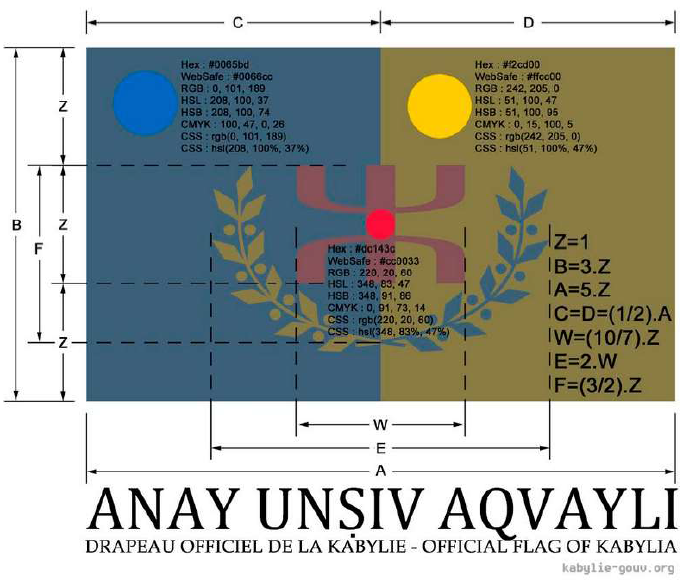
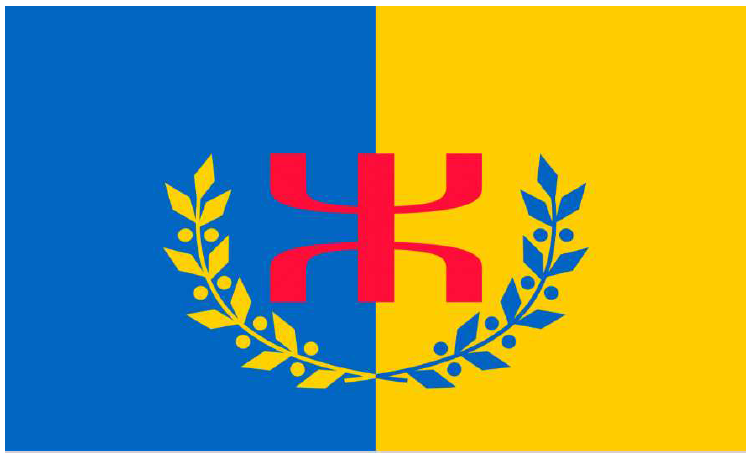
Annex 2 : Kabyle National Anthem
made public on April 20th, 2010
■ A: Text of the Kabyle National Anthem
ASS N TLELLI [DAY OF FREEDOM]
This day is the day of freedom
This day when, from among the nations,
Kabylia emerges
The whole world will see us
Climbing the highest step
Of the podium
Neither falling, nor stumbling,
On an uninterrupted march
Always ready to defend ourselves
We are a people of freedom
A people of light
We are fire and iron
We are the heaven and Earth
The moon and the moonlight
Honour and humanity
We are sweetness and love
The centre and the edge
The ocean and the continent
Able to face jungle and desert
The hand that never trembles
For us to fight for peace
We have the Right and the strength To sit among the Great
We are synthesis and harmony
We are the hammer and the sickle Mastering science and the atom
In times of peace or of strife,
Kabyle, our name is a crown
Shining on our foreheads with a thousand lights Determined to preserve it
Stand before us all of you,
To applaud our glory
That we are celebrating this day
■ B: Score of the Kabyle National Anthem
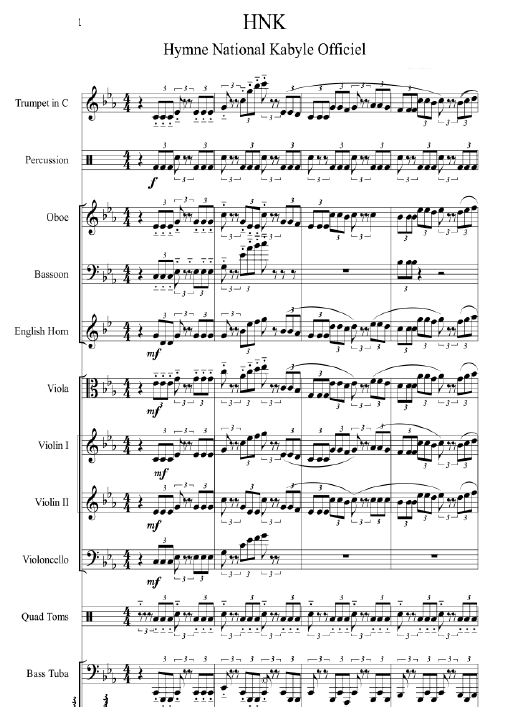
The whole music score is fully consultable in the PDF version (cf. download link below)
■ Annex 3: Declaration of June 5th, 2001
For more than a month and a half now, Kabylia has been subjected to the deadly assaults of power surrounded by a deafening general silence, because the regime and its outposts have, since 1963, organised the methodical marginalisation of this part of the country. Always presented as the internal enemy by the elites and controlled media, Kabylia and the Kabyle people are often suspected, wrongly, because of the mere activism of the single former party, of being a permanent threat to national unity. Its multifaceted particularity, including its identity and linguistic irredentism, lies at the origin of its unofficial relegation to the sidelines of the nation. Many aberrant policies have been justified based on an official will to weaken this insubordinate region: the policy of the Arabising schools, the environment, the civil status and first names; the renaming of sports clubs, just to make the word « Kabylia » disappear from the JSK; the intensification of religious education during CHADLI’s time to pacify the region at the risk of reinforcing the invasive Islamist fundamentalism at the national level; the stripping away of territory by joining whole sections to the bordering wilayas to reduce its geographical importance and facilitate its repression; and in the same vein, there has been the multiplication, since 1980, of the creation of new national gendarmerie barracks to such an extent that none of our daïras have escaped from it. These are the forces that, in the spring of 2001, fired explosive bullets at our young people, who have shown a courage and heroism unparalleled in the history of our country.
It has been 21 years since Kabylia tried in vain to restore Algerian values to the heart of Algeria by making demands linked to the Amazigh identity and language. This has resulted in 21 years of repression and humiliation for a region that only wants to participate in the development of the country, and the well-being of Algerians and respect for their dignity and citizenship. If this power was neither willing to listen to us nor to respect us, if it systematically organises our isolation at the national level, and if it shoots live bullets at young Kabyle protesters, this is because it is the direct heir of the former French colonial State, with its culture and its missions: divide and rule, and deny freedom and democracy for the benefit of a caste that considers the people and the noblest human values to be its worst enemies. Given this state of affairs and the extent of the revolution that has been going on in Kabylia for the past 47 days, notwithstanding those who favour a false national interpretation of the events in Kabylia, the claim for Tamazight to become a national and official language now seems outdated, as do its spokespersons, which are the MCB and the existing parties. As proof of this, we need only look at the meteoric rise of the Archs which, given the urgency of the situation, have been able unite the region across its eternal partisan divisions.
Kabylia’s profound aspiration to live in peace as part of the nation, while enjoying a status of broad autonomy, has become clear. Its peaceful realisation will finally represent the beginning of a genuine, institutional decolonisation of the country as a whole. Out of respect for Algeria, Kabylia and the memory of our martyrs, we have a duty to be true to ourselves, and to listen to the voice of our people. This special status which we have to create in the region, in accordance with the constitution and by consolidating national unity, will enable Kabylia to protect its children, its future and that of the country by showing the latter the true path to freedom, prosperity, justice and dignity.
To achieve this, a petition will be launched today, and an enabling framework will be made public shortly.
Glory to our martyrs !
Long live Kabylia !
Tizi-Ouzou, Maison des Droits de l’Homme [Human Rights House], June 5th, 2001
Ferhat Mehenni
SIWEL 152345 JUN 22


